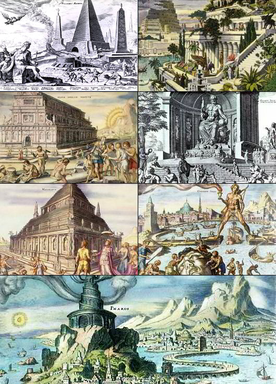
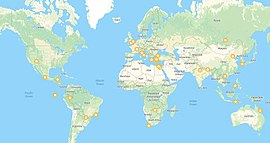
Various lists of the Wonders of the World have been compiled from antiquity to the present day, in order to catalogue the world's most spectacular natural features and human-built structures.
The Seven Wonders of the Ancient World is the oldest known list of this type, documenting the most iconic and remarkable human-made creations of classical antiquity; it was based on guidebooks popular among Hellenic sightseers and as such only includes works located around the Mediterranean rim and in the ancient Near East. The number seven was chosen because the Greeks believed it represented perfection and plenty, and because it reflected the number of planets known in ancient times (five) plus the Sun and Moon.
Seven Wonders of the Ancient World
Main article: Seven Wonders of the Ancient World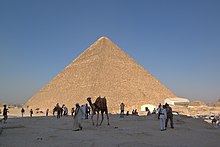
The Greek historian Herodotus (484 – c. 425 BC) and the scholar Callimachus of Cyrene (c. 305–240 BC), at the Museum of Alexandria, made early lists of seven wonders. These lists have not survived, however, except as references in other writings.
The classic Seven Wonders were:
- Great Pyramid of Giza, in Giza, Egypt, the earliest of the wonders to be completed, as well as the only one that still exists in the present day.
- Colossus of Rhodes, in the harbor of the city of Rhodes, on the Greek island of the same name.
- Hanging Gardens of Babylon, in Babylon, near present-day Hillah, Babylon Governorate, Iraq; or Nineveh, Mosul, Nineveh Governorate, Iraq.
- Lighthouse of Alexandria, in Alexandria, Egypt.
- Mausoleum at Halicarnassus, in Halicarnassus, a city of the Achaemenid Empire in present-day Turkey.
- Statue of Zeus at Olympia, in Olympia, Greece.
- Temple of Artemis at Ephesus, in the city of Ephesus, near present-day Selçuk, Turkey.
Lists from other eras
In the 19th and early 20th centuries, some writers emulated the classical list by creating their own lists with names such as "Wonders of the Middle Ages", "Seven Wonders of the Middle Ages", "Seven Wonders of the Medieval Mind", and "Architectural Wonders of the Middle Ages". It is unlikely that any of these lists actually originated in the Middle Ages since the concept of a "Middle Age" did not become popular until at least the 16th century and the word "medieval" was not invented until the Enlightenment era. Brewer's Dictionary of Phrase and Fable refers to them as "later list", suggesting the lists were created after the Middle Ages.
Many of the structures on these lists were built much earlier than the Middle Ages but were well known throughout the world. Typically representative of such lists are:
- Catacombs of Kom El Shoqafa, a 2nd-century funerary complex in Alexandria, Egypt.
- Colosseum, a 1st-century amphitheatre in the centre of the city of Rome, Italy.
- Great Wall of China, a series of defensive fortifications built across the historical northern borders of China, with some segments dating to as early as the 7th century BC.
- Hagia Sophia, a 6th-century cathedral and mosque in Istanbul, Turkey.
- Leaning Tower of Pisa, a 12th-century bell tower in Pisa, Italy.
- Porcelain Tower of Nanjing, a 15th-century pagoda on the south bank of the external Qinhuai River in Nanjing, China.
- Stonehenge, a Neolithic henge monument in Wiltshire, England dated to the 3rd millennium BC.
Other structures sometimes included on such lists include:
- Cairo Citadel, a 13th-century Islamic fortification in Cairo, Egypt.
- Cluny Abbey, a 10th-century Benedictine monastery in Cluny, Saône-et-Loire, France.
- Ely Cathedral, a (currently Anglican) cathedral originally built in the 11th century in Ely, Cambridgeshire, England.
Recent lists
Following in the tradition of the classical list, modern people and organisations have made their own lists of wonderful things, both ancient and modern, natural and artificial. Some of the most notable lists are presented below.
American Society of Civil Engineers

In 1994, the American Society of Civil Engineers compiled a list of Seven Wonders of the Modern World, paying tribute to the "greatest civil engineering achievements of the 20th century".
| Wonder | Date started | Date finished | Location | Significance |
|---|---|---|---|---|
| Channel Tunnel | December 1, 1987 | May 6, 1994 | Strait of Dover, in the English Channel between the United Kingdom and France | Longest undersea portion of any tunnel in the world |
| CN Tower | February 6, 1973 | June 26, 1976 | Toronto, Ontario, Canada | Tallest freestanding structure in the world from 1976 to 2007 |
| Empire State Building | March 17, 1930 | April 11, 1931 | New York City, New York, United States | Tallest structure in the world from 1931 to 1954; tallest freestanding structure in the world from 1931 to 1967; tallest building in the world from 1931 to 1970; first building with 100+ stories |
| Golden Gate Bridge | January 5, 1933 | May 27, 1937 | Golden Gate Strait, north of San Francisco, California, United States | Longest main span of any suspension bridge in the world from 1937 to 1964 |
| Itaipu Dam | January 1970 | May 5, 1984 | Paraná River, on the border between Brazil and Paraguay | Largest operating hydroelectric facility in the world in terms of annual energy generation |
| Netherlands North Sea Protection Works (Delta and Zuiderzee Works) | 1920 | May 10, 1997 | Zeeland, South Holland, North Holland, Friesland and Flevoland, Netherlands | Largest hydraulic engineering project undertaken by the Netherlands during the 20th century |
| Panama Canal | January 1, 1880 | January 7, 1914 | Isthmus of Panama | Allows passage of oceangoing vessels between the Atlantic and Pacific oceans; one of the largest and most difficult engineering projects ever undertaken |
USA Today's New Seven Wonders
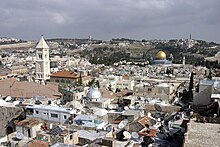
In November 2006, the American national newspaper USA Today and the American television show Good Morning America revealed a list of the "New Seven Wonders", both natural and human-made, as chosen by six judges. The Grand Canyon was added as an eighth wonder on November 24, 2006, in response to viewer feedback.
| Wonder | Location |
|---|---|
| Potala Palace | Lhasa, Tibet |
| Old City of Jerusalem | Israel |
| Polar ice caps | Earth's polar regions (Arctic and Antarctic) |
| Papahānaumokuākea Marine National Monument | Hawaii, United States |
| The Internet | Worldwide |
| Mayan ruins | Yucatán Peninsula, México |
| Great Migration of Serengeti and Masai Mara | Tanzania and Kenya |
| Grand Canyon (viewer-chosen eighth wonder) | Arizona, United States |
Seven Natural Wonders of the World

Similar to the other lists of wonders, there is no consensus on a list of seven natural wonders of the world, and there has been debate over how large such a list should be. One of many existing versions of this list was compiled by CNN in 1997:
- Aurora, in the Earth's high-latitude regions (around the Arctic and Antarctic)
- Grand Canyon, in Arizona, United States
- Great Barrier Reef, off the coast of Queensland, Australia
- Harbor of Rio de Janeiro, Brazil
- Mount Everest, on the border of Nepal and China
- Parícutin volcano, located in the state of Michoacán, Mexico
- Victoria Falls, on the border of Zambia and Zimbabwe
New 7 Wonders of the World
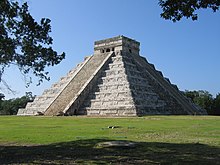
In 2001, an initiative was started by the Swiss corporation New7Wonders Foundation to choose the New 7 Wonders of the World from a selection of 200 existing monuments through online votes. The Great Pyramid of Giza—part of the Giza Pyramids, the only remaining wonder of the traditional Seven Wonders of the Ancient World, was not one of the winners announced in 2007 but was added as an honorary candidate.
| Wonder | Date of construction | Present-day location |
|---|---|---|
| Great Wall of China | Since 7th century BC | China |
| Petra | c. 100 BC | Ma'an, Jordan |
| Christ the Redeemer | opened to the public October 12, 1931 | Rio de Janeiro, Brazil |
| Machu Picchu | c. AD 1450 | Urubamba Province, Peru |
| Chichen Itza | c. AD 600 | Yucatán, Mexico |
| Colosseum | completed AD 80 | Rome, Italy |
| Taj Mahal | completed c. AD 1648 | Agra, India |
| Giza Pyramids (honorary candidates) | completed c. 2560 BC | Giza, Egypt |
New 7 Wonders of Nature
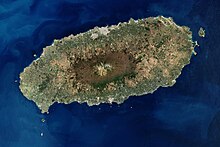
A similar contemporary effort to create a list of seven natural (as opposed to human-made) wonders chosen through a global poll, called the New 7 Wonders of Nature, was organized from 2007 to 2011 by the same group as the New 7 Wonders of the World campaign.
- Iguazu Falls, on the border of the Argentine province of Misiones and the Brazilian state of Paraná
- Hạ Long Bay, in Quảng Ninh province, Vietnam
- Jeju Island, in the Jeju Province of South Korea
- Puerto Princesa Underground River, in Palawan, Philippines
- Table Mountain, overlooking the city of Cape Town, South Africa
- Komodo Island, one of the 17,508 islands that comprise the Republic of Indonesia
- Amazon rainforest, located in Brazil, Peru, Colombia, Venezuela, Ecuador, Bolivia, Guyana, Suriname, and French Guiana
New 7 Wonders Cities
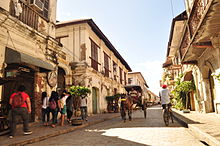
New 7 Wonders Cities, a third list organized by New7Wonders and determined by another global vote, includes entire cities:
- Durban, South Africa
- Vigan, Philippines
- Havana, Cuba
- Kuala Lumpur, Malaysia
- Beirut, Lebanon
- Doha, Qatar
- La Paz, Bolivia
Seven Wonders of the Underwater World

The list of "Seven Wonders of the Underwater World" was drawn up by CEDAM International, an American-based non-profit group for divers that is dedicated to ocean preservation and research. In 1989, CEDAM brought together a panel of marine scientists, including Eugenie Clark, to choose underwater areas which they considered worthy of protection. The results were announced at The National Aquarium in Washington, D.C., by actor Lloyd Bridges, star of TV's Sea Hunt:
- Palau
- Belize Barrier Reef, Belize
- Great Barrier Reef, Australia
- Deep-sea hydrothermal vents (worldwide)
- Galápagos Islands, Ecuador
- Lake Baikal, Russia
- Northern Red Sea, bordered by Saudi Arabia and Yemen on the eastern shore, and Egypt, Sudan, Eritrea, and Djibouti on the western shore
Seven Wonders of the Industrial World

British author Deborah Cadbury wrote Seven Wonders of the Industrial World, a book telling the stories of seven great feats of engineering of the 19th and early 20th centuries. In 2003, the BBC aired a seven-part docudrama exploring the same feats, with Cadbury as a producer.
| Wonder | Description | Completed |
|---|---|---|
| SS Great Eastern | British oceangoing passenger steamship | 1858 |
| Bell Rock Lighthouse | in the North Sea off the coast of Angus, Scotland | 1810 |
| Brooklyn Bridge | in New York City, New York, United States | 1883 |
| London sewerage system | serving London, England | 1870 |
| First transcontinental railroad | 1,912-mile (3,077 km) continuous railroad line connecting existing rail networks in Iowa, Nebraska, Wyoming, Utah, Nevada, and California in the United States | 1869 |
| Panama Canal | 51-mile (82 km) artificial waterway crossing the Isthmus of Panama and connecting the Atlantic and Pacific oceans | 1914 |
| Hoover Dam | on the Colorado River, spanning the border between Nevada and Arizona in the United States | 1936 |
Seven Wonders of the Solar System

In a 1999 article, Astronomy magazine listed the "Seven Wonders of the Solar System". This article was later made into a video.
- Enceladus, a moon of Saturn
- The Great Red Spot of Jupiter, a massive and persistent anticyclonic storm in the planet's southern hemisphere
- The asteroid belt, a region of innumerable small solid bodies located between the orbits of Mars and Jupiter
- The surface of the Sun
- The oceans of Earth
- The Rings of Saturn
- Olympus Mons, an enormous shield volcano on Mars and the tallest planetary mountain in the Solar System
Other lists of wonders of the world
Many authors and organisations have composed lists of the wonders of the world that have been published in book or magazine form.
Seven Wonders of the World is a 1956 film in which Lowell Thomas searches the world for natural and artificial wonders and invites the audience to try to update the ancient Wonders of the World list.
See also
- Eighth Wonder of the World
- National Seven Wonders
- 12 Treasures of Spain
- Seven Wonders of Fore (Fore Abbey, Ireland)
- World Heritage List – a list of over 1,200 sites deemed by UNESCO to be of "outstanding universal value"
Notes
- Both the USA Today article and the Good Morning America broadcast described this wonder as "Jerusalem's Old City, Israel." The Old City is located in East Jerusalem, which is claimed by both the State of Israel and the State of Palestine. The UN and most countries do not recognize Israel's claim to East Jerusalem, taking the position that the final status of Jerusalem is pending future negotiations between Israel and the Palestinian Authority. See Positions on Jerusalem for more information.
References
- Anon. (1993). The Oxford Illustrated Encyclopedia (First ed.). Oxford: Oxford University.
- "The Seven Wonders of the Medieval World"
- ^ Evans, I H (reviser (1975). Brewer's Dictionary of Phrase and Fable (Centenary edition Fourth impression (corrected) ed.). London: Cassell. p. 1163.
- ^ Hereward Carrington (1880–1958). The Seven Wonders of the World: ancient, medieval and modern, reprinted in the Carington Collection (2003). ISBN 0-7661-4378-3.
{{cite book}}: CS1 maint: numeric names: authors list (link) - Carrington, Hereward (September 2010). The Carrington Collection. Kessinger. ISBN 9781169692169. Archived from the original on December 1, 2020. Retrieved October 29, 2014.
- Latham, Edward (1904). A Dictionary of Names, Nicknames and Surnames, of Persons, Places and Things. p. 280. OCLC 01038938.
- Miller, Francis Trevelyan (1915). America, the Land We Love. p. 201. OCLC 00334597. Archived from the original on December 1, 2020. Retrieved October 16, 2020. Excerpts from speeches by Woodrow Wilson, William H. Taft, and Theodore Roosevelt.
- The Complete Idiot's Guide to the Crusades. 2001. p. 153.
- Herbermann, Charles George, ed. (1913). Cluny Abbey. Vol. 4. p. 73. OCLC 06974688. Archived from the original on December 1, 2020. Retrieved October 16, 2020.
{{cite book}}:|work=ignored (help) - The Rough Guide To England. 1994. p. 596.
- "American Society of Civil Engineers Seven Wonders". ASCE.org. July 19, 2010. Archived from the original on August 2, 2010. Retrieved August 30, 2010.
- American Society of Civil Engineers. "Seven Wonders of the Modern World". ASCE.org. Archived from the original on April 2, 2010.
- "USGS: Three Gorges Dam is bigger than Itaipu Dan but annual output is about the same because of river variability". Archived from the original on April 27, 2020. Retrieved October 9, 2019.
- "New Seven Wonders panel". USA Today. October 27, 2006. Retrieved July 31, 2010.
- Clark, Jayne (December 22, 2006). "The world's 8th wonder: Readers pick the Grand Canyon". USA Today. Archived from the original on June 19, 2012. Retrieved May 3, 2013.
- "Natural Wonders". CNN. November 11, 1997. Archived from the original on July 21, 2006. Retrieved July 31, 2010.
- "The multimedia campaign to choose the New 7 Wonders of the World is in its final stage". New7Wonders. Archived from the original on January 3, 2007. Retrieved June 10, 2015.
- "Egypt's pyramids out of seven wonders contest". Daily News Egypt. April 20, 2007. Archived from the original on June 25, 2018. Retrieved June 25, 2018.
- "Reuters via ABC News Australia "Opera House snubbed as new Wonders unveiled" 7 July 2007". Australia: ABC. July 8, 2007. Archived from the original on June 29, 2011. Retrieved July 31, 2010.
- "Great Wall of China". Encyclopædia Britannica. Archived from the original on May 2, 2015. Retrieved February 16, 2012.
- "Underwater Wonders of the World". Wonderclub. Archived from the original on June 13, 2017. Retrieved August 31, 2010.
- Kumar, Manjit (November 7, 2003). "Review: Seven Wonders of the Industrial World by Deborah Cadbury". The Guardian. Archived from the original on September 21, 2016. Retrieved December 13, 2016.
- Cadbury, Deborah (February 17, 2011). "British History in Depth: Seven Wonders of the Industrial World". Archived from the original on December 27, 2019. Retrieved March 25, 2015.
- "Seven Wonders of the Solar System Video". Aaa.org. 1999. Archived from the original on April 1, 2014. Retrieved February 22, 2014.
External links
- 77 Wonders of the World in 360° A list of world wonders linking the ancient 7 Wonders of the World and the World Heritage List by UNESCO
| Seven Wonders of the Ancient World | |
|---|---|
| The Seven Wonders | |
| Related | |
If an internal link incorrectly led you here, you may wish to change the link to point directly to the intended article. Portals:
 Geography
Geography Africa
Africa Ancient Egypt
Ancient Egypt Netherlands
Netherlands Australia
Australia Latin America
Latin America Ecology
Ecology Gardening
Gardening Religion
Religion Queensland
Queensland Ancient Greece
Ancient Greece San Francisco Bay Area
San Francisco Bay Area